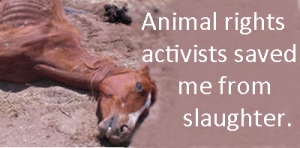Story by Steven Long ~ Publisher of Horse Back Magazine
Horse-Eaters Sink to New Lows
HOUSTON, (Horseback) – Horse slaughter enthusiasts got a rare victory, of sorts, when the United States Senate passed an agriculture appropriations bill that did not contain a provision banning horsemeat inspections at U.S. slaughter plants. HR 3233, will now move to conference committee where conferees will hammer out the final legislation that will be passed by both houses of Congress.A provision banning the use of federal meat inspectors at horse slaughter facilities has been included in every ag money bill since 2007. That, along with laws outlawing slaughterhouses in Texas and Illinois, and a U.S. Supreme Court ruling upholding those laws, spelled doom for the American horse slaughter industry.
A house version of the bill still contains the provision banning use of federal tax dollars to pay meat inspectors in the facilities. No horse slaughter plants currently operate in the United States where horses are not raised for food and. The overwhelming majority of American horses are treated with phenylbutazone (Bute), banned by the FDA in all food animals.

"Slaughterhouse" Sue Wallis Hits a New Low
“Now is the time for the horse people of America to take back the reins of our industry,” it said.
he release, issued over the Internet, showed the head of a dead horse with the caption, “Animal rights activists saved me from slaughter.” There was no explanation from the group of what that meant, but in the paragraph below they wrote, “Radical animal rights anti-slaughter proponents have nothing to do with animal agriculture or animal husbandry…they should not be speaking for horses, or what is in the best interests of animals or people who make their living with them.”
The group is headed by Rep. Sue Wallis, (R) Wyoming, of rural Recluse. It is reported that although she claims to speak for the entire horse industry, Wallis does not own a horse.
The resumption of horse slaughter has strong support from powerful breed associations such as the American Quarter Horse Association, the Arabian Horse Association, and veterinary organizations. The influential American Horse Council, while claiming neutrality on the issue, has quietly supported resumption of slaughter.
Opponents of the practice offer graphic sill photos and videos literally by the thousands of unspeakable cruelty to horses in the slaughterhouses and on transport trucks. Two years ago an expose of practices in Mexican facilities showed horses being maimed by being stabbed in the neck with a sharp knife.
The horses, still living, are hoisted up by the hind legs and bled to death. In a recent scandal in Presidio County, Texas, the carcasses of dead horses from a slaughter holding facility was dumped into a flash flood prone creek during hurricane season. The creek feeds into the heavily used Rio Grande River that separates the U.S. from Mexico where a slaughter house is located just across the border.
Many equine humanitarians also oppose use of the unwieldy captive bolt gun on prey animals such as the horse where misses are as frequent as hits. The captive bolt must strike the horse on the pole precisely on the top of the head.
Related articles
- Texas A&M Fined for Horse Slaughter Transportation Violations (rtfitch.wordpress.com)
- US Horse Slaughter Trade Cruel, Deceptive (rtfitch.wordpress.com)
- Animal’s Angels Investigate a Slaughterhouse of Horrors (rtfitch.wordpress.com)
- Rhapsody Lost in Cesspool of Bloody Horse Slaughter (rtfitch.wordpress.com)
- De-Funding of Horse Slaughter Inspections in Jeopardy (rtfitch.wordpress.com)
No comments:
Post a Comment